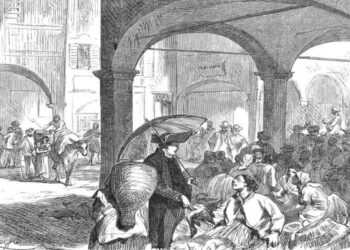CHICAGO – In a somber courtroom on Friday, Judge Richard Donovan denied pretrial release for Xavier L. Tate Jr., a 22-year-old man facing charges related to the off-duty fatal shooting of Chicago police officer Luis M. Huesca in late April.
Tate stands accused of first-degree murder, aggravated vehicular hijacking, and possession of a stolen firearm, among other serious charges, tied to Officer Huesca’s death. The incident has left the Chicago community reeling, prompting an outpouring of grief and sparking renewed calls for addressing violence against law enforcement.
The Fatal Incident
Officer Luis Huesca, 30, was on his way home from a late-night shift in the early hours of April 21 when tragedy struck. He was ambushed and shot multiple times while driving near Chicago’s Southwest Side. Although he was off duty, he adhered to standard protocol by concealing his police uniform under plain clothing to avoid drawing attention. However, this precautionary measure did not deter the assailant from targeting him.
Authorities have since revealed that the shooter, armed with a stolen firearm, fired at Officer Huesca 10 times, striking him in vital areas. The severity of his injuries resulted in his death shortly after he was transported to a nearby hospital. First responders and medical staff worked tirelessly to save the young officer’s life, but the magnitude of the injuries proved insurmountable.
Officer Huesca’s death left behind a devastated family, friends, and an entire law enforcement community reeling from the loss of one of their own. His dedication to serving the Chicago community was widely known, and his sudden, violent death left many in shock and disbelief. The killing has ignited sorrow and outrage across Chicago and has strengthened calls for stricter measures to safeguard law enforcement officers.
Evidence And Investigation
At a Friday news conference, Chicago Police Chief of Detectives Antoinette Ursitti provided insight into the meticulous investigation that ultimately led to the arrest of Xavier L. Tate Jr.
Investigators scoured through hours of video footage from more than 90 surveillance cameras across Chicago to track Tate’s movements before and after Officer Luis Huesca’s fatal shooting. This comprehensive review of surveillance images yielded pivotal clues that helped detectives build a timeline of events.
One crucial piece of evidence came from a nearby business where Tate used a relative’s bank card to purchase a bottle of water. Surveillance footage from that location provided investigators with clear images of Tate’s clothing, which matched those worn by the suspect during the shooting. When police later recovered Huesca’s stolen vehicle, they discovered the same bottle of water and clothes that aligned with the suspect’s appearance, further linking Tate to the crime.
The growing body of evidence prompted a Cook County judge to issue an arrest warrant for Tate on April 26. Just three days later, he was apprehended by the Chicago Police Department and the U.S. Marshals Great Lakes Regional Fugitive Task Force. The swift collaboration between law enforcement agencies ensured Tate’s capture and marked a significant step toward justice for Officer Huesca’s grieving family and community.
Impact on Huesca’s Family and Community
In the wake of Officer Luis Huesca’s tragic death, his family shared a heartfelt statement capturing the immense grief and devastation that gripped them and the broader community. “The vile nature of this crime and its devastating impact on our family and the community demand the uncompromising pursuit of justice.
While no measure of justice can bring Officer Huesca back or fully heal our hearts, we take solace in his enduring legacy of service and bravery,” the family declared, underscoring their pain and commitment to justice.
The loss of Officer Huesca reverberated deeply through the ranks of the Chicago Police Department and beyond, prompting an outpouring of support from his fellow officers, city officials, and residents alike.
On April 29, hundreds of mourners lined the streets to pay their respects to the officer, whose dedication to service and community left a lasting legacy. As Huesca’s casket made its way to the St. Rita of Cascia Shrine Chapel, the overwhelming turnout stood as a poignant testament to the impact of his career and the connections he forged.
Within the chapel, services provided a moment of reflection and solace for those who knew him personally or admired his courage and dedication. The ceremony underscored how deeply Huesca’s death resonated with many and reiterated the crucial work of first responders who put their lives on the line daily. As he was laid to rest, Officer Huesca’s enduring legacy as a devoted public servant and an individual of unwavering bravery was celebrated and mourned by the countless lives he touched.
The Legal Proceedings Ahead
During Xavier L. Tate Jr.’s initial court appearance on Friday, prosecutors presented an extensive body of evidence implicating him in the murder of Officer Luis Huesca. This included comprehensive surveillance footage and forensic findings, all of which prompted Judge Richard Donovan to deny bail due to the severity of the charges and Tate’s perceived flight risk. Tate faces multiple accusations, including first-degree murder, aggravated vehicular hijacking, and possession of a stolen firearm.
The Associated Press reached out to the Cook County State’s Attorney’s Office for clarity regarding Tate’s legal representation, but it remains uncertain if he has secured an attorney at this stage. This will likely be clarified in subsequent proceedings.
The denial of pretrial release signals that the upcoming trial will be a closely watched, high-profile case. The prosecution is expected to present video footage that tracks Tate’s movements on the night of the shooting, testimonies from law enforcement personnel involved in the investigation, and forensic evidence directly linking Tate to the crime scene.
If convicted on the charge of first-degree murder, Tate could face a life sentence without the possibility of parole. Additional charges for aggravated vehicular hijacking and possession of a stolen firearm could further strengthen the case against him and intensify the penalties he faces.
The trial will draw significant public attention, not only because of its implications for Officer Huesca’s family and colleagues but also the Chicago community at large. The outcome will be seen as a measure of justice for the grieving family and a step toward addressing the critical issue of violence against law enforcement officers.
This latest tragedy has reignited calls for greater protections for law enforcement officers and renewed the spotlight on violent crime rates across Chicago. Superintendent Larry Snelling reiterated the department’s commitment to ensuring justice for Officer Huesca and his family. “Officer Huesca exemplified bravery and selflessness in his role, and we will not rest until his killer is brought to full justice,” Snelling emphasized.
At the same time, many Chicago residents have voiced frustration over the perceived lack of safety on the city’s streets and the impact violent crimes have on both residents and first responders. In addition to the loss of Officer Huesca, many police departments nationwide have faced challenges around recruitment and retention amid the rising dangers officers face daily.
Despite the overwhelming grief, Officer Huesca’s family and colleagues are focusing on preserving his legacy. Known for his unwavering dedication to the force and his warm relationships with fellow officers, Huesca leaves behind an enduring legacy. His commitment to service is a reminder of the many risks that law enforcement officials take daily, whether on or off duty, to keep communities safe.
Police Chief of Detectives Ursitti reiterated this sentiment at the press conference. “Officer Huesca embodied the best of the Chicago Police Department. He was driven by compassion, integrity, and the desire to protect. We owe it to his memory to see this investigation through to the very end,” Ursitti remarked.
As Chicago prepares for a high-profile trial, the pursuit of justice remains a top priority. For Officer Luis Huesca’s family, friends, and the broader law enforcement community, the path to closure will be a long and challenging one. The denial of pretrial release for Tate represents a crucial step toward ensuring accountability for Huesca’s untimely death. The city will undoubtedly be watching closely, awaiting justice for an officer whose unwavering bravery in life left an indelible mark on all who knew him.







